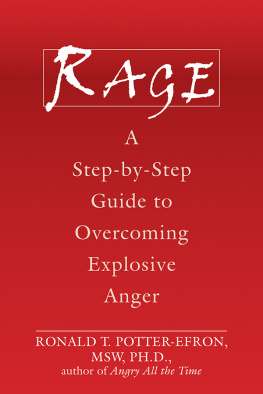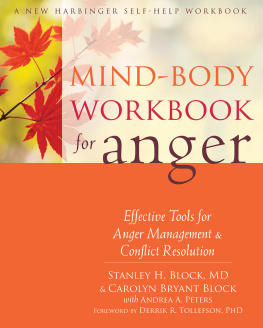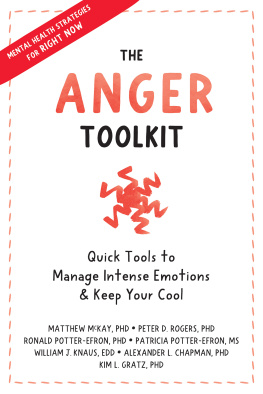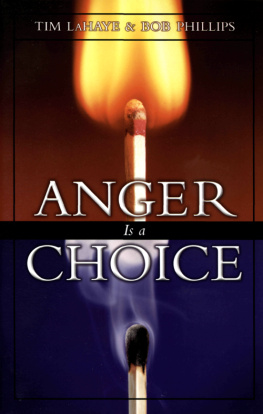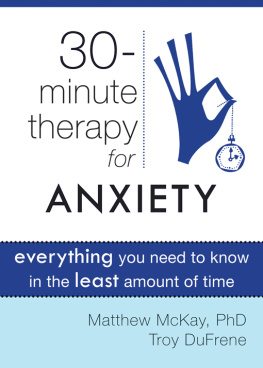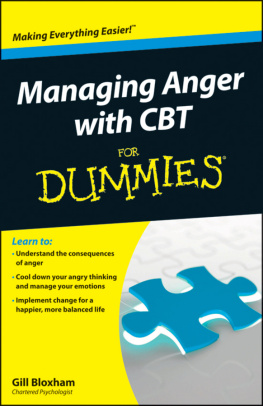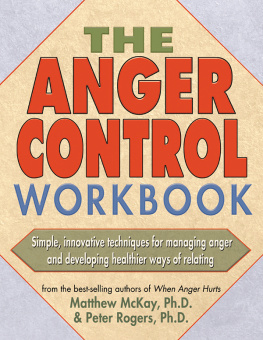About the Authors
Ronald T. Potter-Efron, PhD, LCSW, is a psychotherapist in private practice in Eau Claire, WI, who specializes in anger management. He is author of Angry All the Time and coauthor, with Patrick Fanning, of Letting Go of Anger.
Patricia S. Potter-Efron, MS, is a clinical psychotherapist at First Things First Counseling Center in Eau Claire, WI.
Excessive Anger and Its Costs
What You Need to Know
This book is designed to give readers with at least some anger problems quick and effective ways to control their anger. Since you are reading this book, you probably realize your anger is creating problems, sometimes serious ones, in your lifeand youre no longer minimizing the problem or in denial.
Since anger almost certainly has been causing problems for you and others, lets begin by taking a good look at how your anger and/or aggression may have messed up your life.
- Your spouse, partner, or past partners: arguments, breakups, physical violence
- Your children or stepchildren: useless fights, loss of love, loss of connection
- Your family of origin (parents, siblings): endless battles, cutoffs where people wont talk with you, physical fights with brothers and sisters
- At work or school: arguments with coworkers or schoolmates, getting fired or suspended, failure to get promoted
- With the law: police calls, disorderly conduct charges, no-contact orders
- Your physical or mental health: increased anxiety and/or depression, anger-related accidents, high blood pressure
- Your finances: fines, replacing broken objects, attorney fees, cost of anger management programs
- Your values and spirituality: broken promises not to get angry or lose control, guilt and shame after blowups, anger at God
- Anything else: ________________________
exercise. How has your anger and aggression caused you problems?
Taking It Further
Heres a suggestion about how you can use your knowledge of the negative effects of your anger to help you plan your changes.
exercise Go through the items above to decide which things you most need to work on immediately. Please dont say all of them because thats probably too much to take on right now. Instead, be selective. Ask yourself this question: Where is my anger causing the most friction, trouble, loss, and painboth to myself and to othersright now?
Example: For instance, if your relationship with your twelve-year-old step-daughter is a disaster that your anger is only making worse, then make a commitment to quit getting angry at her no matter what she says or does. Or maybe youre close to losing your job because of your cynical attitude. So for now, make a promise to yourself to keep those nasty thoughts and comments to yourself at work. That will buy you some time to change at a deeper level to eventually quit thinking those mean-spirited thoughts and even start thinking more positive thoughts about your coworkers.
We want to say one thing to you at the very start of this book: you and you alone are in charge of your anger. Thats both good and bad, of course. Its good because you can take full responsibility for making your life better. Its bad because you cant blame others for your problems. Thats not to say that everybody you know wears halos on their heads. Nobodys perfect. For instance, maybe your partner has bad days during which he or she becomes easily irritated without reason. The key question is what you will do with that behavior. Will you accept these anger invitations and react with anger, sarcasm, and aggression? Or will you pass on them, letting them go because theyre not worth getting all upset over? You and you alone will make the decisions that determine how frequently you become angry and how much damage you do to yourself and others with your anger.
More in Practices and Examples at http://20290.nhpubs.com
Your Anger Management Goals
What You Need to Know
Anger is an emotion that usually occurs in an episodic pattern (as does fear, but not sadness, which follows more of a wavelike, waxing and waning pattern). An episode of anger typically consists of a fairly clear beginning (She implied I was lazy, and right away that ticked me off), a surge of emotion that reaches a specific intensity level (Id give it about a 6 on my heat meter), and a definite ending (I stayed mad about an hour, but then I cooled down). You can use this information to help you change the ways you handle your anger.
First, you could set a goal of getting angry less often. Perhaps right now you become irritated or worse five times a day on average. Imagine how much your life would improve if you could get that number down to twice a day within a month and eventually down to just once a week.
You could also set a goal of becoming less intensely angry. That would take discipline, of course, but wouldnt you feel better if even when you did get mad you could stay calm enough to think and talk reasonably?
The third goal is to shorten the length of your anger episodes. This one is especially important if you sometimes hang on to your anger for long periods.
We have one more anger management goal to ask you to considerto do less damage when you become angry. Needless to say, this fourth goal is critical if you have developed the habit of breaking objects, smashing your fist into a wall, striking others when you become angry, or the like. But remember that you can also do a lot of damage to others with mean words. Verbal attacks can be just as devastating to the people we love as physical assaults.
exercise. Please take some time to think about these four goals. How important are they to you? Which one is most important right now? Start with that goal and go from there.
Taking It Further
Lets briefly mention a few reasons why its difficult to meet each of these goals.
- Getting angry less often. You may have developed such a strong habit of anger that it comes almost automatically.
- Becoming less intensely angry. Your body seems only to have an on/off switch for anger, not a better regulator.
- Shortening the length of an anger episode. You have such a strong desire to get in the last word or to win an argument that you cant walk away.
- Do less damage. You really want to hurt others when you get mad, so its hard not to say or do mean things.
exercise. Imagine this is gut-check time. Thats when you look fearlessly into your soul to see yourself at your nastiest. Now think about what youre like when you become angry. Can you visualize the mean part of you that really wants to attack and harm others? Whats it like? How do you look when youre out to get someone? Most importantly, what are you going to do with your inner nasty as you try to cut down on your anger and aggressiveness?
More in Practices and Examples at http://20290.nhpubs.com
The Substitution Principle
What You Need to Know
People with anger problems usually come to our office with one goal in mind. They want to become less angry. Or, more extreme, they want never to get angry again (which, of course, is impossible). We tell them thats not enough. Lessening their anger represents only half a goal. They also need to come up with a set of positive goals that will replace their old negative thoughts, feelings, and actions. They need to replace all that time with more positive thoughts, feelings, and behaviors. If not, theyll just create a vacuum, a low-energy place where they arent getting angry but also arent doing anything positive. We call this process of replacing negative energy with positive energy
Next page


